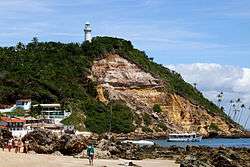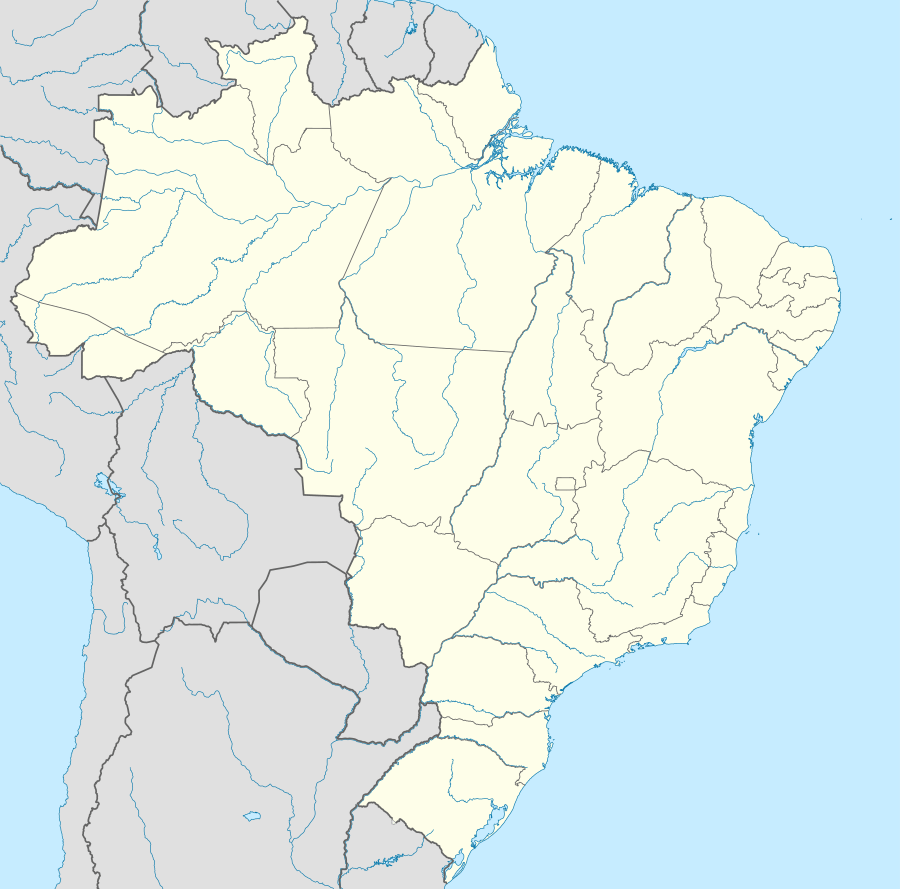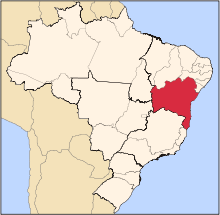Cairu
Cairu is a municipality in the state of Bahia in the North-East region of Brazil. The municipality has a population of 18,176 with a population density of 33.3 inhabitants per square kilometer. The municipality consists of three island: the Island of Cairu, which is only separated from the mainly by a narrow river; Tinharé Island, which has the dense tourist settlement of Morro de São Paulo to the north; and Boipeba Island.[1][2]
Cairu Município de Cairu | |
|---|---|
 Morro de São Paulo in Cairu | |
 Location of Cairu in the Bahia | |
 Cairu Location of Cairu in the Brazil | |
| Coordinates: 13°29′13″S 39°02′38″W | |
| Country | |
| Region | Northeast |
| State | |
| Founded | 1608 |
| Government | |
| • Mayor | Fernando Antonio dos Santo Brito |
| Area | |
| • Total | 451.194 km2 (174.207 sq mi) |
| Population (2019) | |
| • Total | 18,176 |
| • Density | 40/km2 (100/sq mi) |
| Time zone | UTC-3 (BRT) |
| Website | cairu |
The Cairu region was home to a large population of Aimoré people. The Portuguese arrived in the area early in the 16th century. Francisco Romeo, administrator of the Captaincy of São Jorge dos Ilhéus founded a small settlement in Cairu based on its mild climate. The settlers displaced the Aimoré and the settlement, known as the Vila de Nossa Senhora do Rosário do Cairú, was established in 1608. By 1911 the village consisted of five districts: Cairu, the village seat; Galeão; Gamboa; Morro de São Paulo; and Velha Boipeba.[2]
The municipality contains part of the 230,296 hectares (569,070 acres) of the Caminhos Ecológicos da Boa Esperança Environmental Protection Area, created in 2003.[3]
Noted resident
Portugal football international Liedson was born in Cairu.
See also
References
- Corrêa, Maria de Fátima Pires Ferreira (2006). "Turismo em Morro de São Paulo : uma análise dos impactos". Brasília: Universidade de Brasília, Centro de Excelência em Turismo: 33. doi:10.26512/2006.03.TCC.578. Cite journal requires
|journal=(help) - "Cairu" (in Portuguese). O Instituto Brasileiro de Geografia e Estatistica. 2019. Retrieved 2019-12-20.
- Souto, Paulo; Khoury, Jorge (5 June 2003), Decreto nº 8.552 de 05 de junho de 2003 (in Portuguese), Estado da Bahia, retrieved 2016-10-26
